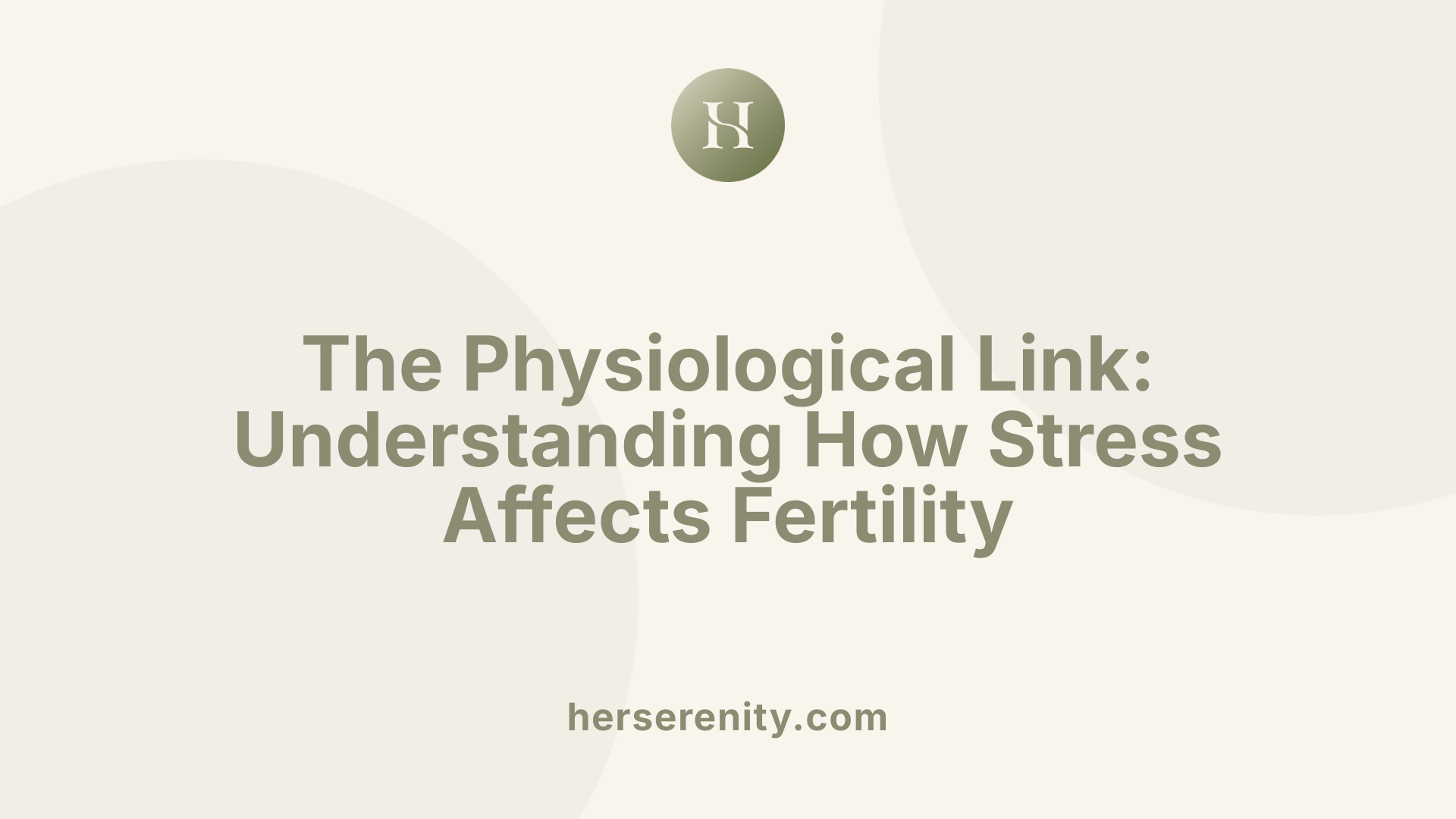How Stress Impacts Your Ability to Conceive
Unraveling the Complex Relationship Between Stress and Fertility

The Subtle Impact of Stress on Reproductive Health
Stress is often an unavoidable aspect of modern life, but its influence can extend far beyond day-to-day worries, especially when it comes to reproductive health. While stress does not directly cause infertility, its effects can play a significant role in both male and female fertility. This article delves into the intricate ways stress impacts the ability to conceive, explores the myths surrounding stress and infertility, and provides insights into managing stress for better reproductive outcomes.
Understanding Stress and Its Physiological Impact on Fertility

Physiological effects of stress on reproduction
Stress can lead to a range of physiological changes that negatively impact reproductive health. Women experiencing high stress often face hormonal imbalances that interfere with ovulation and menstrual cycles. This disruption can manifest as irregular cycles or anovulation, making conception difficult.
Additionally, chronic stress can lead to long-term variations that could affect overall fertility, with as much as 30% of infertility cases linked to stress factors. This interplay creates a challenging atmosphere for attempting to conceive, as stress hormones can interfere with essential reproductive processes.
Role of stress hormones in fertility
Cortisol and alpha-amylase are two stress hormones that have been shown to have significant impacts on fertility. Elevated levels of cortisol can disrupt the balance of reproductive hormones like estrogen and progesterone, crucial for ovulation and maintaining a healthy pregnancy. Studies have found that women with higher salivary alpha-amylase levels experience increased time-to-pregnancy and higher infertility rates.
Moreover, these stress hormones can reduce blood flow to the reproductive organs and inhibit the release of vital reproductive hormones, adversely affecting fertility outcomes.
Influence of stress on ovulation and implantation
Stress has a direct effect on both ovulation and the implantation process. High cortisol levels can impede the hypothalamus, which regulates hormonal signals essential for ovulation, leading to delayed or missed ovulation. Furthermore, increased stress can create a hostile environment in the uterus for implantation; the elevated levels of stress hormones can lead to increased uterine contractions, potentially hindering the fertilized egg's ability to implant successfully.
In summary, managing stress is vital not just for mental well-being but also for fostering a conducive physiological environment for conception.
Debunking the Myths: Stress and Its Complex Relationship with Fertility

What are the myths about stress and fertility?
There are several myths surrounding stress and fertility that require clarification. A common misconception is that stress directly causes infertility. While it certainly contributes to emotional strain, research indicates that stress does not significantly hinder the basic physiological processes involved in conception. Women's experiences demonstrate that many have successfully conceived even amidst stressful life events, challenging the idea that stress outright prevents pregnancy.
Another widespread belief is that simply relaxing or halting IVF treatments will lead to pregnancy. However, scientific studies suggest that psychological distress may not be strongly linked to lower pregnancy rates. Moreover, the rates of spontaneous conception after discontinuing IVF treatments tend to be modest. Thus, the relationship between stress and infertility is intricate and cannot be reduced to a straightforward causal link.
Understanding these nuances is crucial for individuals navigating infertility, as proper stress management may improve emotional well-being without eliminating underlying biological factors.
Why is it important to differentiate between these myths and facts?
Distinguishing between these myths and facts is essential as it helps individuals manage expectations and encourages constructive coping strategies. Clarity about the complexities of fertility can lead to more effective support systems and healthier approaches during family planning.
The Role of Stress in Delaying Ovulation and Its Fertility Implications

How stress affects ovulation
Stress significantly influences the body's hormonal balance, particularly through the impact of cortisol, a stress hormone. When stress levels rise, cortisol disrupts the signaling necessary for proper ovulation. This can lead to:
- Irregular menstrual cycles: Women may experience cycles that become unpredictable.
- Anovulation: In some cases, women may not ovulate at all.
- Missed periods: Severe stress can even lead to the complete absence of menstruation.
The variation in stress impact means that individual experiences can differ greatly. Some may find that stress causes notable delays in ovulation, while others might notice minimal changes.
Consequences of stress-related ovulation delays
Delays in ovulation due to stress can have important consequences for fertility. Couples trying to conceive may find that:
- Increased time to pregnancy: Higher cortisol levels correlate with longer times to conceive due to disrupted timing of ovulation.
- Difficulties in synchronization: Couples often struggle to coordinate intercourse with a woman’s fertile window, further complicating conception efforts.
- Impact on assisted reproduction: Stress can adversely affect outcomes in assisted reproductive technologies like IVF, as the hormonal disruptions may lower pregnancy success rates.
While stress can complicate the path to conception, it is crucial to recognize that stress management techniques such as yoga, deep breathing, and meditation can be effective in mitigating these effects and potentially enhance fertility outcomes.
Stress and Its Detrimental Effects on Egg and Sperm Quality

How does stress affect egg quality?
Stress negatively affects egg quality through various biological mechanisms. Increased cortisol levels during stress can inhibit the production of estradiol, a hormone crucial for oocyte development and overall reproductive health. Elevated cortisol not only disrupts hormonal balance but also affects metabolic processes essential for healthy egg maturation.
In addition to hormonal interference, stress can lead to elevated levels of reactive oxygen species (ROS). While ROS are necessary in moderation for cellular functions, high levels can become harmful, leading to oxidative stress. This oxidative stress can induce apoptosis (cell death) in oocytes and granulosa cells, further deteriorating oocyte quality.
To counteract these effects, implementing lifestyle changes such as a balanced diet, regular exercise, and antioxidant supplementation may help improve reproductive health and egg quality.
Can stress cause infertility in males?
Yes, stress can significantly contribute to infertility in males. Psychological stress has a negative impact on hormone levels, such as testosterone and luteinizing hormone, which are vital for sperm production and overall semen quality. Research indicates that both acute and chronic stress conditions can impair testicular function, leading to reduced sperm parameters like concentration, motility, and viability.
Moreover, lifestyle factors associated with stress, such as poor diet, lack of sleep, and unhealthy habits like smoking, can exacerbate fertility issues. Although stress alone may not directly cause infertility, its role in compromising male reproductive health is well-documented and warrants attention.
| Impact Dimensio | Women | Men |
|---|---|---|
| Egg Quality | Elevated stress reduces estradiol levels affecting oocyte development. | N/A |
| Sperm Quality | N/A | Chronic stress lowers testosterone; affects sperm production and quality. |
| Mechanisms | Increased cortisol and oxidative stress. | Impaired testicular function due to hormonal imbalance. |
| Recommendations | Antioxidant supplements and lifestyle modifications. | Healthy lifestyle adjustments and stress management. |
Emphasizing stress management techniques can not only improve mental health but may also enhance fertility outcomes for both partners.
Effective Stress Management Techniques to Enhance Fertility

Strategies for Reducing Stress and Improving Fertility
Managing stress is crucial for improving fertility outcomes and overall well-being. Effective approaches that have shown promise include:
- Mind-Body Programs: Participating in structured programs focused on stress management, such as yoga or meditation, has been associated with increased pregnancy rates. One study indicated a 52% success rate in women undergoing IVF who adhered to such practices compared to 20% in those who did not.
- Therapy and Counseling: Cognitive behavioral therapy (CBT) has demonstrated efficacy in reducing stress-related anxiety, thereby improving emotional health and potentially enhancing fertility.
- Healthy Lifestyle Choices: Maintaining a balanced diet, engaging in regular exercise, and ensuring quality sleep are key in mitigating stress.
- Relaxation Techniques: Practices like deep breathing, journaling, and massage not only reduce stress but also foster a positive mental environment conducive to conception.
Importance of Lifestyle Changes and Psychological Interventions
Lifestyle modifications play a vital role in stress management for those trying to conceive. Research shows that coping strategies and emotional support significantly affect fertility outcomes. Notably, addressing psychological factors through interventions can enhance pregnancy rates. As stress-related conditions negatively impact health, adopting a holistic approach to fertility by integrating physical health and emotional wellness can lead to improved conception possibilities.
Can your body recover from years of stress?
Yes, recovering from years of chronic stress is possible. Implementing lifestyle changes such as regular physical activity, maintaining a balanced diet, optimizing sleep, and exploring relaxation techniques like yoga and meditation can significantly aid recovery. Additionally, identifying and managing personal stressors, along with reframing negative thoughts through methods like cognitive behavioral therapy, can help mitigate the long-term effects of stress. It is essential to recognize the impact of chronic stress on both physical and mental health, as it can lead to conditions like anxiety, depression, and cardiovascular issues. By adopting effective stress management strategies, individuals can pave the way for improved well-being and resilience against stress.
Exploring Research Findings on Stress and Fertility Treatments
Impact of stress on IVF and IUI
Research has established a strong link between stress and reproductive health, particularly concerning assisted reproductive technologies like IVF and IUI. Studies indicate that elevated stress levels can lead to reduced pregnancy rates, making stress management crucial for couples seeking to conceive.
For instance, a study led by Dr. Lidia Mínguez-Alarcón showcased that women experiencing high stress levels before conception were less likely to achieve live births, particularly during IVF compared to IUI. This suggests that stress not only affects the likelihood of conception but can also significantly influence pregnancy outcomes.
Research insights into stress and fertility outcomes
Various studies have illuminated how stress can impact fertility outcomes. Elevated salivary alpha-amylase levels, a stress marker, are linked to a longer time-to-pregnancy and increased infertility risks. Specifically, women with high levels of this enzyme face a two-fold increased risk of infertility compared to those with lower levels.
Additionally, cognitive behavioral therapy (CBT) has been shown to nearly double pregnancy rates, illustrating the importance of mental health support. Other stress reduction methods, such as yoga and acupuncture, have also been associated with improved fertility outcomes.
| Study Focus | Key Findings | Significance |
|---|---|---|
| Impact of stress on IVF/IUI | High stress reduces pregnancy rates in IVF more than IUI | Highlights need for stress management in treatments |
| Salivary alpha-amylase and fertility | Higher levels correlate with longer time-to-pregnancy and increased infertility risks | Emphasizes stress as an important fertility factor |
| Cognitive behavioral therapy (CBT) | Nearly doubles pregnancy rates among participants | Shows mental health support can enhance fertility outcomes |
Concluding Thoughts on Stress and Reproductive Health
Understanding the multifaceted role stress plays in fertility is crucial for those navigating the often challenging path to parenthood. While stress does not directly cause infertility, its influence on ovulation, implantation, and overall reproductive health cannot be overlooked. By recognizing and managing stress through effective strategies, individuals can improve their mental well-being and potentially enhance their chances of conception. It’s imperative to approach fertility health with both awareness and proactive measures, acknowledging the complex interaction between stress and reproduction.
References
- Stress relief from infertility - Mayo Clinic Health System
- How Stress Can Hurt Your Chances of Having a Baby - WebMD
- Preconception stress increases the risk of infertility: results from a ...
- Does Stress Affect Fertility Treatments? - Mass General Brigham
- How Does Stress Affect Fertility? - A. Michael Coppa, MD
- HOW STRESS AFFECTS FERTILITY - Rocky Mountain Fertility Center
- The relationship between stress and infertility - PMC































































































